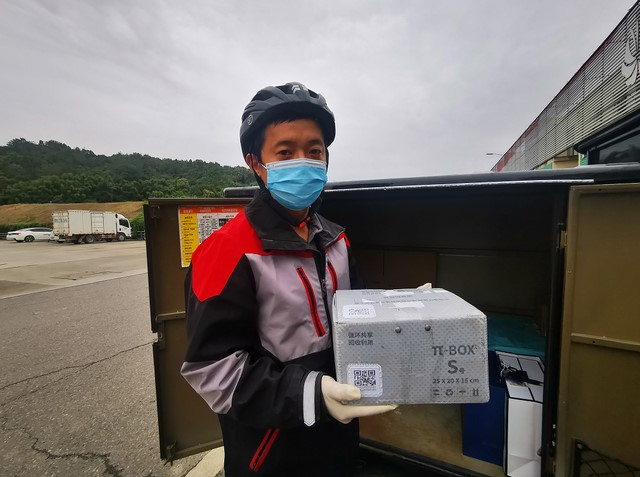China's courier industry accelerates green, low-carbon development
As this year's Double 11 online shopping festival nears, express delivery companies in Shigatse city, southwest China's Xizang Autonomous Region have been busy handling parcels. Each outlet of Chinese courier ZTO Express here sets up a recycling bin to reuse packaging boxes.
"At first, we advised customers to unpack their parcels on the spot and put packaging boxes in the recycling bin. They gradually got used to such a model," said Zuo Xiaofeng, an executive at ZTO Express' Shigatse branch.
Zuo added that the company's 22 outlets in the city now have recycling bins, and the recycling rate of packaging boxes is high.

A deliveryman shows reusable packaging at an express delivery outlet of SF Express, a leading Chinese courier enterprise, in Beichuan Qiang Autonomous County, southwest China's Sichuan Province. (Photo/the media center of Beichuan Qiang Autonomous County)
In September 2023, Yunda Express, another Chinese express delivery firm, launched its first smart mailbag that can be reused many times. "No wrapping tapes are needed for the smart mailbag, which saves materials and is more eco-friendly," said Zhou Baigen, executive vice president of Yunda Express, adding that this type of mailbag has been promoted and used in multiple cities nationwide.
Lin Hu, an official of the State Post Bureau (SPB), said that over 90 percent of paper packaging waste including envelopes and boxes in the courier sector can be recycled.
Thanks to the efforts of the whole courier sector, China has made initial progress in advancing green packaging. By the end of September this year, over 90 percent of e-commerce parcels no longer had been packaged a second time, and more than 800 million express packages used reusable packages. 127,000 express service outlets set up standard-compliant packaging waste recycling facilities, and over 600 million corrugated boxes that were in a good condition were recycled and reused.
According to an SPB survey of packages in China in May 2023, over 75 percent of express packages were up to standard. Full coverage of electronic waybills had been achieved in the country's courier industry. It had reduced the layers of corrugated cardboards on corrugated boxes from five to three, and tape width from 60 mm and above to 45 mm and below.
As of the end of September, 132 companies have obtained 158 green certificates of express packaging products, said Lin.
Lin noted that China's courier sector is transitioning from a phase of green packaging to a stage of all-around green transformation that boosts high-quality development guided by the country's "dual carbon" goals.
So far this year, major express delivery companies have increased investments in renewable energy and infrastructure construction. While improving transfer efficiency, they have been promoting the green transformation of logistics parks.
SF Express, a leading Chinese courier enterprise, has built photovoltaic power stations in its 12 logistics parks in cities like Yiwu, Hefei, and Quanzhou. In the first nine months of this year, these stations' renewable energy power generation exceeded 15 million kWh, which is equivalent to a reduction of over 10,000 tonnes of carbon dioxide emissions.
New energy and clean energy vehicles have been further promoted in the courier sector. China aims to see that over 80 percent of new vehicles and replacements for old ones in pilot areas such as the courier sector should be new energy vehicles by 2025, according to a notice issued by eight departments ,including the SPB, in February this year.
"Major express delivery companies have widely adopted new energy and clean energy vehicles," said Lin.
The use of new intelligent devices in the sector has also been promoted. JD Logistics, the delivery arm of Chinese e-commerce giant JD.com, has deployed smart delivery robots in many cities on a regular basis, while SF Express has used drones for deliveries.
In recent years, major delivery firms in China have accelerated the adoption of new intelligent facilities like drones, driverless vehicles, unmanned warehouses, and smart parcel boxes to improve efficiency while reducing carbon emissions.
Photos
Related Stories
- China's express delivery sector reports rapid expansion in first eight months
- China's express delivery sector expands in August
- Online sales drive delivery sector growth
- "Next day delivery" in the depths of Tianshan Mountains
- Advisers call for greater protection of couriers' rights
- China's express delivery sector grows as consumption recovers
Copyright © 2023 People's Daily Online. All Rights Reserved.









